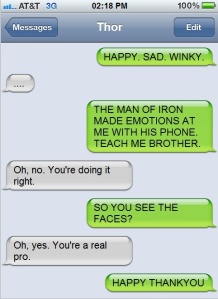On characters and movies and stuff: Loki
I recently watched Thor: The Dark World. Now, being an Avengers/Marvel/Movies/Comics fanatic, I would have made it a point to catch that movie in the big screen anyway. But then we all know that where Hiddleston is concerned, geek-status turns out to be only one half of the motivation.
Now, I’m not going to be the gushing fan girl (in this post at least). This is about characterization (I think). We’ve seen this before, we’ve read these same stories, these very same moments in other narratives: The Trickster Villain teetering on the line that separates “redemption from damnation” (Chris Hemsworth’s words, watch the video interview if you haven’t already).
Storytellers love to construct characters that are as real as living, ‘ordinary’ people in their shortcomings, quirks and weaknesses, while at the same time, giving them these unrealistic, fantastic aspects.
Recipe: Shower that character with charm and wit, place that character under duress, clothe him in misunderstanding and heart-break and let him loose in a universe (alternate or otherwise) run by the very same principles our ‘mundane’ world runs on, and WHAM! Result: You have yourself a loved-tragic-villain in the making.
And we cannot help but fall in love with that character. In spite of being familiar with the stereotype, in spite of having read, watched and sobbed over so many, many similar such stories. I’m not writing or saying anything new here when I declare that we absolutely require our protagonists and antagonists today, in the context of our current ’21st Century’ lives, to exhibit traits that are both good and bad. It’s been years since we’ve closed the chapter on characters that are just 100% clean and ‘good’ or 100% evil.
Which is the thing I took back home with me from the theater after watching Thor 2.
(That and this solemn promise to myself: download hundreds more of Tom Hiddleston’s pictures as well as make a board for him on Pinterest).
I’m not saying I didn’t enjoy the movie otherwise. I loved it actually, despite the rather dragged-out, stretched-thin ending fight scene. (And this coming from somebody who loves action movies.) I loved Frigga. Her character is epic and it was so natural at the same time (and if I say more, It’ll be a major SPOILER so I won’t).
I read on this review that Thor was not made with any ‘redeemable quirks’ (read here) – he didn’t have those shortcomings, those ‘shades of grey’ (ugh, that book has totally ruined that phrase for me) that Loki possesses. But I don’t think that’s true. Thor is a proud god, even if he is no longer arrogant. If you make him out to be so, he could easily step into darkness because he has been too straightforward for too long. Anyway, I’m rambling now.
(And another thing – don’t you just love the memes with a technologically-challenged Thor? I think that’s pretty redeemable! As in, his general lack of skill with such things)
Of course Loki is my favorite (and Iron Man; always Iron Man) and his character has been developed so well, portrayed so well, that Thor does come off as rather one-dimensional in comparison. But I think it’s because we can put Thor and Loki in opposition (Trubetzkoy anybody??) that each character, Loki being the focus here, is so exquisitely defined.
So, coming back to the line between ‘good’ and ‘evil’ and such things, after watching interviews of the cast and the crew and after Thor 2 (and Thor 1, which as a movie, I think was better put together than the sequel), I regained my passion for the bleeding-heart-villain character type and I kept trying to figure it out in my head: Why is it so epic, why do I love it so much?
And I came up with:
Most people understand that it’s such a murky, tenuous line, the one between madness and sanity. It’s never 100% of either one. It’s always a combination; two sides of a coin, to use the clichéd metaphor.
But there’s this one particular aspect that really intrigues me: the way it manifests in people. You can have a lifetime filled with madness, defined by innumerable acts of woe and tragedy, marked by acts of insufferable cruelty and pain. And in the midst of this continuum, you could have a few moments of sanity.
Or maybe, in a sane, calm life, you have instances of instability. Momentary madness that is so epic in its manifestation, so complete in its consumption of your soul that you are as much defined by those few moments as you are by the rest of your otherwise clean, safe and mundane life. Until, of course, you descend into complete madness because of those few moments and what they mean to you.
And that is super-relatable. On some level, we’d all like to explain the worst shortcomings in us as instances of madness; we all hope that when we (if we haven’t already) hit that point, we’ll be understood for both the good and the bad in us.
Or something less dramatically-cliched.
Related articles
- Loki: Exploring The Development of A Sympathetic Villain (modernminutia.wordpress.com)
- Ha-ha, Good Ol’ Marvel. (caitlynlinares.wordpress.com)

